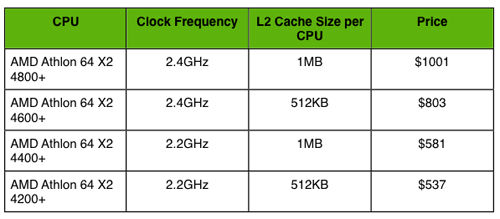AMD's dual core Opteron & Athlon 64 X2 - Server/Desktop Performance Preview
by Anand Lal Shimpi, Jason Clark & Ross Whitehead on April 21, 2005 9:25 AM EST- Posted in
- CPUs
The Lineup - Athlon 64 X2
As we mentioned earlier, the Athlon 64 X2 isn't going to be officially launched until June. While AMD is purposefully vague in their discussion of availability, it looks like their plans are for system builders and OEMs to offer Athlon 64 X2 systems in Q3 of this year and for retail availability to be in Q4 of this year.For AMD, the Athlon 64 4000+ was the last single core Athlon 64 that they will make; all model numbers after 4000+ will be dual core Athlon 64 X2s. Starting at 4200+ and going up to 4800+, the Athlon 64 X2 continues AMD's trend of basing model numbers on clock speeds and cache sizes. You can see the breakdown below:

The other major difference between AMD and Intel's dual core desktop approach is in pricing. Let's take a look at the cost per core of the Athlon 64 X2:

That being said, let's compare it to Intel's pricing:

AMD's answer to Intel's aggressive pricing is two-fold. Eventually, all of AMD's CPUs will be dual core, and thus, prices will be driven back down to single core levels. But for now, AMD feels confident enough that their single core CPUs are fast enough to compete with Intel's low clocked Pentium Ds. We put that exact thinking to the test in Part II of our Intel dual core preview and concluded that it really depends on what type of a user you are. If you tend to multitask a lot or run a lot of multithreaded applications, then a slower Intel dual core is what you need; otherwise, a faster single core AMD is your best bet.










144 Comments
View All Comments
morcegovermelho - Thursday, April 21, 2005 - link
page 3 "For example, the Opteron 252 and Opteron 852 both run at 2.6GHz, but the 252 is for use in up to 2-way configurations, while the 852 is certified for use in 4- and 8-way configurations. The two chips are identical; it's just that one has been run through additional validation and costs a lot more. "I thought that they had different number of HyperTransport (HT) links:
152 - 1 HT
252 - 2 HT
852 - 3 HT
I thought that was the reason why it was impossible to use two 152s in a two-way motherboard.
Maybe i'm wrong.
faboloso112 - Thursday, April 21, 2005 - link
great articlefungmak - Thursday, April 21, 2005 - link
#50Dual 875s have 4 cores
stmok - Thursday, April 21, 2005 - link
I have waited SOOOOO long! Finally, a reason to dump my dual PIII setups. Next stop, Athlon64 X2!jediknight - Thursday, April 21, 2005 - link
Can someone explain the huge performance difference between the dual Operaon 252s (2.6GHz) and the dual Opteron 875 (2.2GHz)?Since:
"The two chips are identical; it's just that one has been run through additional validation and costs a lot more"
I would expect the 252s, running at 400MHz more, would outperform the 875s. Can someone explain this (large) discrepency?
snedzad - Thursday, April 21, 2005 - link
Yes. That's gonna be a four proc-machine. Terrific.I am really astonished about whole AMD K8 architecture. And K9 should be 4-core processor architecture.
Can't wait.
But, I still won't get a rid of my AX2600 machine.
Griswold - Thursday, April 21, 2005 - link
Ah the brilliant KillerBob.Anand used plenty of real world apps for the multitask benchmarks.
How much more real world testing would you want to go with your (pointless) whining?
GoatHerderEd - Thursday, April 21, 2005 - link
Why is their stock price at a 6 month low? I hope this pulls it up a bit. It would be a shame if they don’t start making a profit.suryad - Thursday, April 21, 2005 - link
I just am astounded at the performance these first versions of dual core processing that is being presented to us...WOW...couple that with a well written 64 bit OS and it will be even more smoking!! I think AMD did a job extremely well done and I am glad that they are being aggressive in keeping their pockets full with the prices of their chips. I personally dont think that would stop me from buying their processors. I would wait for the FX to become dual core though. A 3 ghz dual core FX would rock so bad!!!Also one more thing...so the Tyan mobo holds 2 procs correct? So if we stuck a dual core in 1 socket and another in the other sock...that makes it a 4 proc machine then right?!!
bldckstark - Thursday, April 21, 2005 - link
Thanks for the double post KillerBob. Your statements are as intelligent as your ability to use a keyboard.